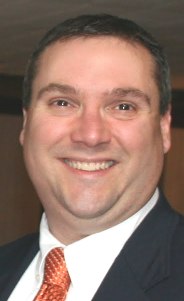Take the proper steps to protect your computer from viruses, hackers
Malware, ransomware, hackers, scams, viruses.

The sound of the words themselves is scary. Just think of the horror that arrives when these “diseases” actually infect a person’s computer.
Safeguarding one’s computer from uninvited software and/or criminal activity should not be taken lightly, according to two longtime Batavia businessmen who specialize in computer sales, repair and data protection.
Paul Marchese (top photo) of Marchese Computer Products on Ellicott Street and Marc Johnson (bottom photo) of Millennium Computers on Washington Avenue gave almost identical responses when it comes to protecting computer files.
“Backup, backup, backup,” Marchese said, “and always back to more than one place, such as separate external hard drives or recovery systems. And never, and I repeat never, use DVD or flash drives as primary backups. Both of these devices fail on a regular basis.”
Johnson agreed.

“It’s important to save multiple iterations of the files – local backup and offsite (Cloud) backups,” said Johnson, who, like Marchese, offers managed offsite backup along with anti-virus, anti-malware and critical update services.
Backups of a computer’s (or network of computers’) programs, data files and hard drives are essential should a computer crash or be infected by viruses or a devious hacker.
For those not familiar with the terminology:
-- Malware is software that is intended to damage or disable computers and computer systems.
-- Ransomware is a type of malicious software designed to block access to a computer system until a sum of money is paid.
-- Viruses are types of malicious codes or programs written to alter the way a computer operates and are designed to spread from one computer to another. They can be spread through email and text message attachments, Internet downloads, social media scam links, mobile devices and smart phones – and can be disguised as attachments to such things as funny images, greeting cards, or audio and video files.
A necessary first step, Marchese said, is to install top-rated virus and spyware software on your computer.
“Symantec, BitDefender and McAfee are the top three,” he said. “In our industry – more than most – you get what you pay for. Free anti-virus does not do much more than what is built in, and that is not good.”
Both Johnson, whose business is in its 20th year, and Marchese, who opened in 1981, said they have been busy restoring individuals’ and business computers from viruses, phony messages and from hackers purporting to be from Microsoft, Facebook or other legitimate companies claiming they have information that the computer is infected.
“They’re all fake. No one from these companies ever will call you because your machine is infected,” Marchese said. “These unscrupulous people just want access to your machine so they can encrypt and force you to pay to get the key.”
Computer pop-ups can create havoc as well.
“Oftentimes a message will pop up on your screen, stating that the computer is infected and that a call needs to be made to Microsoft to fix it,” Johnson said. “This illicits an emotional response and the user will call the number and let the person remote into their computer.”
This usually opens a Pandora’s Box for trouble, resulting in anywhere from the computer being encrypted and locked (ransomware) to personal passwords and account information being stolen.
Marchese said the best response to an unsolicited call is to tell them “my computer guy is coming in an hour to install my new printer, so I’ll have him take a look at it. Never go to your machine – tell them it is off if they keep pressing you.”
Johnson also mentioned a virus known as “locky,” which can come as an attachment to an email stating that a shipment is delayed or one with a similar message.
“Once you open the email, the virus basically encrypts all your documents,” he said, “and you can’t decrypt them unless you pay them to get the key. You’re held ransom.”
Some other measures people can take to protect themselves are as follows:
-- Updating operating systems and software on a regular basis;
-- Enabling Microsoft product updates;
-- Installing anti-malware, anti-spyware, firewall and anti-exploit technology;
-- Destroying all personal info on hardware you plan to sell (erasing the hard drive);
-- Avoiding Wi-Fi that is not password protected;
-- Placing passwords on all devices, including desktops, laptops, phones, smart watches, tablets, cameras, etc., and using the fingerprint lock for the iPhone and passkey or swipe for Android.
